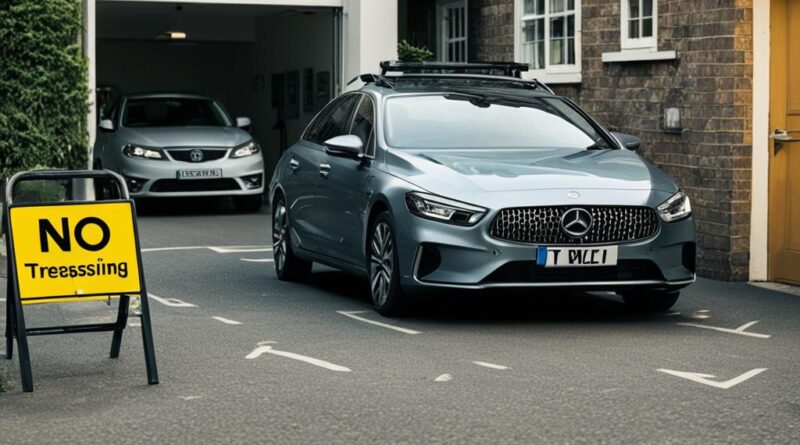Avoid Car Repossession: How to Park Your Car to Avoid Repo
Car repossession can be a stressful and detrimental experience, not only impacting your daily life but also harming your credit score. Learning about car repossession prevention tips and taking appropriate measures like secure parking for avoiding repo can be of great help in safeguarding your vehicle. In this article, we will discuss some effective steps to park your car to prevent repossession, legal considerations, open communication with lenders, and alternatives to protecting your car ownership and financial future.
Key Takeaways
- Understand the legalities of car repossession and self-help repossession laws in your state.
- Maintain transparent communication with your lender for potential alternatives to repossession.
- Utilize strategic parking techniques and private property rights as a temporary measure to prevent repossession.
- Explore alternatives such as loan restructuring, payment deferment, or bankruptcy for lasting solutions against repossession.
- Recognize the long-term consequences of repossession on your credit score and future loan prospects.
Understanding the Risk of Car Repossession
Car repossession can be a devastating experience for vehicle owners. Understanding the risks and legalities associated with repossession is crucial in devising an effective preemptive strategy. We will explore the legality of self-help repossession, discuss the importance of communicating with your lender, and examine the impact of repossession on your credit score.
The Legality of Self-Help Repossession
Self-help repossession is legally recognized in most states, meaning that a lender can take back a vehicle when the borrower defaults without needing a court order. Exploring avoiding repo with smart parking techniques can help protect your vehicle, but it’s essential to familiarize yourself with the repossession laws in your state to ensure your methods are both effective and legal.
Communicating with Your Lender: A Preemptive Strategy
Clear communication with your lender can often lead to more favorable outcomes than avoiding contact. Lenders typically prefer receiving payment over repossessing a vehicle, so developing a proactive approach by discussing your financial difficulties and exploring alternative solutions can be invaluable. This can include options such as loan restructuring, deferment, and potential payment plan adjustments.
Impact of a Repossession on Your Credit Score
Repossession can have a severe and long-lasting impact on your credit. Late payments leading to repossession and a loan default can remain on your credit report for seven years, further compromising your ability to secure future loans. Employing parking tips to prevent car repo may temporarily safeguard your car from repossession, but the long-term damage to your credit score will still need to be addressed. Consider seeking professional financial advice to create an action plan to repair your credit in the event of repossession.
Securing Your Vehicle: Parking Strategies Against Repossession
Legally protecting your vehicle from repossession can be achieved by employing defensive parking methods to avoid repo and preventing car repo with proper parking habits. Using locked private property, like a garage, to store the vehicle is one such method; however, this is a short-term solution and does not prevent eventual legal actions from creditors. Repossession agents are not allowed to breach the peace, which includes forcing entry into a locked space without a court order.

It’s crucial to keep in mind that if a replevin order is obtained, you are legally obligated to comply and return the vehicle to avoid violation of a court order. To prolong your car’s safety, consider the following parking strategies:
- Park your car in a private garage or behind locked gates to deter repossession agents.
- Opt for well-lit, public parking areas where the repossession process would be more visible and less likely to occur.
- Take advantage of restricted access parking lots with surveillance to provide additional security for your vehicle.
- Rotate parking locations to make it more challenging for repossession agents to locate your car.
While these parking strategies can help protect your car from immediate repossession, they serve as temporary measures and should be combined with proactive efforts to negotiate with your lender and explore financial alternatives.+
Negotiating with Lenders to Prevent Vehicle Seizure
As a car owner who seeks to prevent repossession, it is crucial to be proactive and engage in negotiations with your lender. Employing various car parking strategies to avoid repo is only one aspect of the solution; exploring alternative payment solutions and understanding loan restructuring options play a significant role in safeguarding your vehicle from repossession.
Finding Alternative Payment Solutions
Exploring alternative payment solutions involves maintaining transparent communication with your lender. Lenders are typically open to discussing options such as deferment or forbearance. Deferment allows you to temporarily postpone payments, while forbearance enables a reduction of your monthly payments for a fixed period. These options can provide temporary relief, and help you take practical steps to park your car to prevent repossession.
Understanding the Consequences of Hiding a Vehicle
Though it may be tempting to rely solely on car parking strategies to avoid repo, hiding your car from repossession agents may escalate the situation, potentially leading to more severe legal consequences. Instead of solely counting on discreet parking locations, it is key to take a more comprehensive approach, focusing on proactive communication with your lender and reaching mutual agreements to avoid vehicle seizure.
Exploring Loan Restructuring Options
Loan restructuring is a practical approach to preventing repossession while maintaining car ownership and managing payments in a more sustainable manner. By negotiating new terms with your lender, you may be able to secure a lower interest rate, extend your loan term, or adjust your monthly payment. Before you decide to restructure your loan, consult with a financial advisor to ensure it is a viable solution for your specific financial situation.
Bankruptcy and Repossession: Knowing When It’s an Option
While safeguarding your car from repossession through parking can provide temporary relief, it is essential to consider more sustainable solutions. Bankruptcy might serve as a legal means to temporarily stall the repossession process if a repayment plan can be arranged with the lender. The two primary bankruptcy options, Chapter 13 and Chapter 7, may allow you to retain your vehicle while offering a framework for restructuring the debt associated with the car loan.
Bankruptcy should only be considered as a last resort after exhausting all other available options.
Consulting with a knowledgeable bankruptcy attorney is crucial in determining whether this approach is the right fit for your financial situation and to help create a viable path forward with your vehicle’s loan. Your lawyer may also guide you on how to strategically combine parking strategies with legal solutions for a greater chance of keeping your car.

- Chapter 13 Bankruptcy: Often referred to as a wage earners’ plan, this type of bankruptcy allows individuals with a regular income to develop a tailored repayment plan to settle debts over a three-to-five-year period.
- Chapter 7 Bankruptcy: Commonly known as liquidation bankruptcy, Chapter 7 discharges most of your unsecured debts. However, retaining your vehicle under Chapter 7 may be more challenging as the trustee may sell your property to repay creditors. You will need to use an exemption to protect your vehicle’s equity and maintain loan payments for this option.
Regardless of which bankruptcy option you pursue, it is vital to weigh the benefits and downsides of each and seek professional guidance to ensure you’re making the best decision in your specific financial circumstances.
| Chapter 13 | Chapter 7 |
|---|---|
| Repayment Plan (3-5 years) | Liquidation of Assets |
| Allows for Vehicle Retention | Requires Use of Exemptions and Continued Payments |
| Suitable for Individuals with Regular Income | Discharges Most Unsecured Debts |
How to Park Your Car to Avoid Repo
While it is essential to maintain open communication with your lender and explore alternative payment solutions, parking your car strategically can be an effective way to temporarily deter repossession agents. Let’s explore some car repossession prevention tips and how to park your car to avoid repo.

Defensive Parking Habits to Deter Repossession Agents
Parking your car in well-lit, public areas can make it more difficult for repossession agents to seize your vehicle unnoticed. Additionally, use parking spaces that have restricted access and surveillance, such as gated communities or secured parking lots, to provide an added layer of protection.
Leveraging Private Property Rights for Vehicle Protection
One way to take advantage of your private property rights is to park your car in a locked garage, making it more challenging for repossession agents to access your vehicle. While this tactic only provides temporary protection, it can give you enough time to negotiate with your lender or explore alternative payment options.
Smart Parking Techniques: Discreet and Legal Locations
Finding discreet and legal parking locations is another effective way to deter repossession agents. Consider parking your car in a friend’s garage, a different neighborhood, or another low-profile area not commonly known to repossession agents. Remember, though, that strategic parking should be just one part of a comprehensive plan including open communication with your lender and potential payment plan adjustments.
Conclusion
When it comes to evading car repossession, understanding your legal rights and maintaining open communication with your lender is a priority. By using the car repossession prevention tips outlined in this article, you give yourself the best chance of avoiding unwanted financial stress. Strategic parking methods, such as secure parking for avoiding repo and employing steps to park your car to prevent repossession, serve as effective temporary measures. However, these car parking strategies should be considered as a supplementary solution alongside more comprehensive financial alternatives.
Devising smart parking techniques can aid safeguarding your car from repossession through parking. Make use of parking tips to prevent car repo, including defensive parking methods and being aware of your private property rights. While these strategies can prevent car repo temporarily, it is vital to engage with your lender and explore various financial alternatives to achieve a long-term solution.
Ultimately, the combination of knowledge, communication, and proactive financial planning is the key to avoiding car repossession. Utilize the strategic parking tips mentioned above, but importantly, maintain open dialogue with your lender in order to devise long-term solutions, such as loan restructuring or bankruptcy, for preventing future car repo situations.
FAQ
What is self-help repossession and is it legal?
Self-help repossession is a practice in which a lender repossesses a borrower’s vehicle without needing a court order when the borrower defaults on their loan. This method is legal in most states, allowing creditors to recover the vehicle without judicial intervention.
How can communication with the lender help prevent repossession?
Clear and open communication with your lender offers a preemptive strategy for avoiding repossession. Lenders usually prefer to receive payment and may provide alternative solutions like loan restructuring or allowing a skipped payment with permission. Maintaining contact can lead to better outcomes than avoiding communications.
How does a repossession impact my credit score?
A repossession has a severe and long-lasting impact on your credit score. After late payments lead to repossession and loan default, this incident can remain on your credit report for seven years. This negative mark could compromise your ability to secure financing or loans in the future.
What are some defensive parking habits I can adopt to deter repossession agents?
Some defensive parking habits to deter repossession agents include parking in well-lit, public areas, or using areas with restricted access and surveillance. Discreet but legal parking locations can provide a temporary solution while you negotiate with the lender, but this should not be considered a long-term solution.
Can filing for bankruptcy help to prevent vehicle repossession?
Filing for bankruptcy can temporarily halt the repossession process if a payment arrangement is made with the lender. Depending on the type of bankruptcy, your vehicle may be retained while restructuring the debt associated with the loan. Consult with a bankruptcy attorney to explore if this option is suitable for your financial situation.
What are some alternative payment options or strategies I can negotiate with my lender to avoid repossession?
Engaging your lender in negotiations can offer alternative payment solutions, such as loan restructuring, deferment options, or temporary payment reduction. Finding a workable payment plan can help you avoid repossession while managing payments in a more sustainable way.

